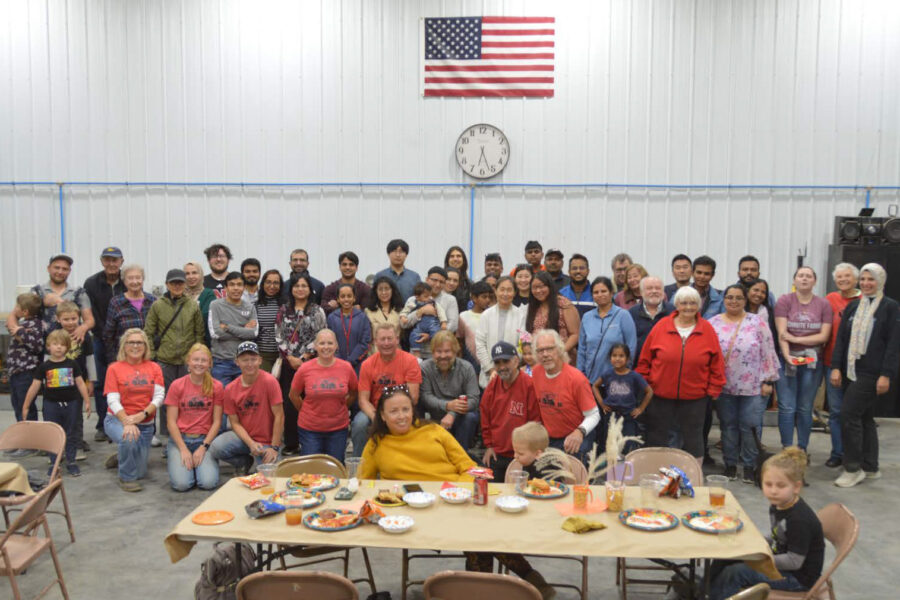An unconventional collaboration between UNMC researchers and an Elmwood, Nebraska, farm family has led to a possible new therapy for Parkinson’s disease.
Extracellular vesicles from bovine colostrum – known as “first milk” for newborn calves – have shown promise in fighting neurodegenerative disease in human disease animal models in an as-yet-unpublished study, UNMC researchers say.
John and Carae Oehlerking’s friendship and blossoming scientific collaboration with Howard Gendelman, MD, and the UNMC Department of Pharmacology and Experimental Neuroscience research team, co-led by Susmita Sil, PhD, has been transformative, Dr. Gendelman said.
“We have successfully purified a product from colostrum that has a unique ability to control the brain’s nerve cell-killing inflammatory activities and halt degenerative responses seen in the early stages of Parkinson’s disease,” said Dr. Sil, assistant professor and senior scientist in the PEN department. The Oehlerkings and the Oehlerking Farm will be credited on a forthcoming paper alongside the Nebraska neuroscience research team.
Carae Oehlerking said the family recently hosted the research team for a “Farm Festival.”
“We learned about the current research and enjoyed interacting with researchers at UNMC. At the same time, we wanted to share our love of the farm with them and allow the scientists to see where the colostrum originated,” she said. “The connection we have had with UNMC over the past year and a half has helped us build a special relationship with people we could have never imagined working with.”
The scientists agreed it was a pleasure to work with the Oehlerkings.
“The milk colostrum – received within 24 hours after the calf birth – showed strong neuroprotective properties in a rodent model of Parkinson’s disease,” Dr. Sil said. Specifically, extracellular vesicles derived from colostrum showed promising potential to inhibit the neuroinflammatory and neurodegenerative process underlying the disease, which causes a profound loss of dopamine.
“This unique property makes this a promising therapy for addressing the cause of Parkinson’s disease,” said R. Lee Mosley, PhD, professor and director of the movement disorders research program at the UNMC Department of Pharmacology and Experimental Neuroscience. He added that the therapy showed little to no side effects, offering a potentially more effective and disease-modifying treatment than existing therapies. The collaboration between the farming and UNMC teams may impact a range of other degenerative diseases, including Alzheimer’s, stroke, multiple sclerosis and amyotrophic lateral sclerosis, Dr. Mosley said.
“Most importantly, this project may lead to future natural therapeutics in Parkinson’s disease and other neurodegenerative diseases,” said Carol Swarts, MD, a UNMC graduate, long-term medical center supporter and part of the Oehlerking family. “It is a blessing for UNMC researchers in such a supportive environment.”
While visiting the farm, UNMC researchers and their families – about 60 people in all – combined and offloaded corn into a truck, went on hay rack rides, fed cattle and picked pumpkins from the Oehlerkings’ patch. The day ended with a meal and s’mores around a bonfire.
“This program has embedded the farm community directly into the ongoing research, and the learning and information has been a two-way street,” Dr. Gendelman said.
“That makes this project unique. It is only possible with ‘town and gown’ working together,” Dr. Swarts said.
Keith Swarts and Jayme Nekuda, both formerly with UNMC and longtime supporters of UNMC research, organized the farm visit.
“The Oehlerkings are researchers in their own right,” Keith Swarts said. “They are teaching us more about colostrum from their knowledge of calving and ranching. The collaboration between farming community members and UNMC investigators will provide solutions to improve our world.”

This is awesome – a perfect example of the importance of collaboration. Kudos to all.
Thanks, Tom. Of course, the big question is what we put into the exosomes to enhance their activities and ultimately develop them as a means to treat or even prevent Parkinson’s disease.
Howie
I love this collaboration!! It brings so many folks together that otherwise would never have the opportunity to learn from one another. This is truly “boots on the ground” research!